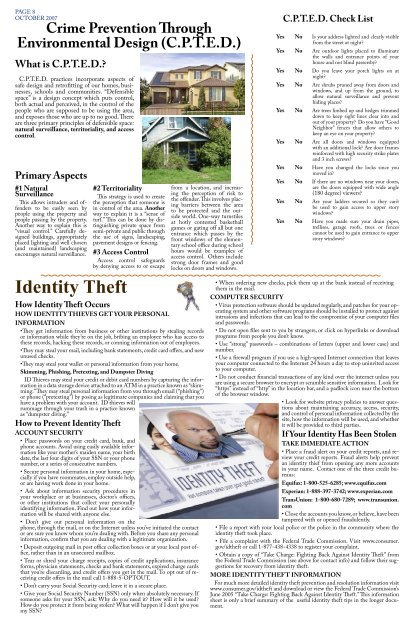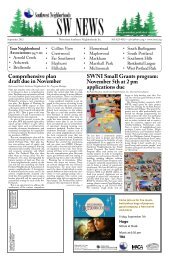October 2007.indd - Southwest Neighborhoods, Inc.
October 2007.indd - Southwest Neighborhoods, Inc.
October 2007.indd - Southwest Neighborhoods, Inc.
Create successful ePaper yourself
Turn your PDF publications into a flip-book with our unique Google optimized e-Paper software.
PAGE 8<br />
OCTOBER 2007<br />
Crime Prevention Through<br />
Environmental Design (C.P.T.E.D.)<br />
What is C.P.T.E.D.?<br />
C.P.T.E.D. practices incorporate aspects of<br />
safe design and retrofitting of our homes, businesses,<br />
schools and communities. “Defensible<br />
space” is a design concept which puts control,<br />
both actual and perceived, in the control of the<br />
people who are supposed to be using the area,<br />
and exposes those who are up to no good. There<br />
are three primary principles of defensible space:<br />
natural surveillance, territoriality, and access<br />
control.<br />
Primary Aspects<br />
#1 Natural<br />
Surveillance<br />
This allows intruders and offenders<br />
to be easily seen by<br />
people using the property and<br />
people passing by the property.<br />
Another way to explain this is<br />
“visual control.” Carefully designed<br />
buildings, appropriately<br />
placed lighting and well chosen<br />
(and maintained) landscaping<br />
encourages natural surveillance.<br />
Identity Theft<br />
#2 Territoriality<br />
This strategy is used to create<br />
the perception that someone is<br />
in control of the area. Another<br />
way to explain it is a “sense of<br />
turf.” This can be done by distinguishing<br />
private space from<br />
semi-private and public through<br />
the use of signs, landscaping,<br />
pavement designs or fencing.<br />
#3 Access Control<br />
Access control safeguards<br />
by denying access to or escape<br />
How Identity Theft Occurs<br />
HOW IDENTITY THIEVES GET YOUR PERSONAL<br />
INFORMATION<br />
•They get information from business or other institutions by stealing records<br />
or information while they’re on the job, bribing an employee who has access to<br />
these records, hacking these records, or conning information out of employees.<br />
•They may steal your mail, including bank statements, credit card offers, and new<br />
unused checks.<br />
•They may steal your wallet or personal information from your home.<br />
Skimming, Phishing, Pretexting, and Dumpster Diving<br />
ID Thieves may steal your credit or debit card numbers by capturing the information<br />
in a data storage device attached to an ATM in a practice known as “skimming.”<br />
They may steal personal information from you through email (“phishing”)<br />
or phone (“pretexting”) by posing as legitimate companies and claiming that you<br />
have a problem with your account. ID thieves will<br />
rummage through your trash in a practice known<br />
as “dumpster diving.”<br />
How to Prevent Identity Theft<br />
ACCOUNT SECURITY<br />
• Place passwords on your credit card, bank, and<br />
phone accounts. Avoid using easily available information<br />
like your mother’s maiden name, your birth<br />
date, the last four digits of your SSN or your phone<br />
number, or a series of consecutive numbers.<br />
• Secure personal information in your home, especially<br />
if you have roommates, employ outside help,<br />
or are having work done in your home.<br />
• Ask about information security procedures in<br />
your workplace or at businesses, doctor’s offices,<br />
or other institutions that collect your personally<br />
identifying information. Find out how your information<br />
will be shared with anyone else.<br />
• Don’t give out personal information on the<br />
phone, through the mail, or on the Internet unless you’ve initiated the contact<br />
or are sure you know whom you’re dealing with. Before you share any personal<br />
information, confirm that you are dealing with a legitimate organization.<br />
• Deposit outgoing mail in post office collection boxes or at your local post office,<br />
rather than in an unsecured mailbox.<br />
• Tear or shred your charge receipts, copies of credit applications, insurance<br />
forms, physician statements, checks and bank statements, expired charge cards<br />
that you’re discarding, and credit offers you get in the mail. To opt out of receiving<br />
credit offers in the mail call 1-888-5-OPTOUT.<br />
• Don’t carry your Social Security card; leave it in a secure place.<br />
• Give your Social Security Number (SSN) only when absolutely necessary. If<br />
someone asks for your SSN, ask: Why do you need it? How will it be used?<br />
How do you protect it from being stolen? What will happen if I don’t give you<br />
my SSN?<br />
from a location, and increasing<br />
the perception of risk to<br />
the offender. This involves placing<br />
barriers between the area<br />
to be protected and the outside<br />
world. One-way turnstiles<br />
at hotly contested basketball<br />
games or gating off all but one<br />
entrance which passes by the<br />
front windows of the elementary<br />
school office during school<br />
hours would be examples of<br />
access control. Others include<br />
strong door frames and good<br />
locks on doors and windows.<br />
C.P.T.E.D. Check List<br />
Yes No Is your address lighted and clearly visible<br />
from the street at night?<br />
Yes No Are outdoor lights placed to illuminate<br />
the walls and entrance points of your<br />
house and not blind passersby?<br />
Yes No Do you leave your porch lights on at<br />
night?<br />
Yes No Are shrubs pruned away from doors and<br />
windows, and up from the ground, to<br />
allow natural surveillance and prevent<br />
hiding places?<br />
Yes No Are trees limbed up and hedges trimmed<br />
down to keep sight lines clear into and<br />
out of your property? Do you have “Good<br />
Neighbor” fences that allow others to<br />
keep an eye on your property?<br />
Yes No Are all doors and windows equipped<br />
with an additional lock? Are door frames<br />
reinforced with high security strike plates<br />
and 3 inch screws?<br />
Yes No Have you changed the locks since you<br />
moved in?<br />
Yes No If there are no windows near your doors,<br />
are the doors equipped with wide angle<br />
(180 degree) viewers?<br />
Yes No Are your ladders secured so they can’t<br />
be used to gain access to upper story<br />
windows?<br />
Yes No Have you made sure your drain pipes,<br />
trellises, garage roofs, trees or fences<br />
cannot be used to gain entrance to upper<br />
story windows?<br />
• When ordering new checks, pick them up at the bank instead of receiving<br />
them in the mail.<br />
COMPUTER SECURITY<br />
• Virus protection software should be updated regularly, and patches for your operating<br />
system and other software programs should be installed to protect against<br />
intrusions and infections that can lead to the compromise of your computer files<br />
and passwords.<br />
• Do not open files sent to you by strangers, or click on hyperlinks or download<br />
programs from people you don’t know.<br />
• Use “strong” passwords – combinations of letters (upper and lower case) and<br />
number.<br />
• Use a firewall program if you use a high-speed Internet connection that leaves<br />
your computer connected to the Internet 24 hours a day to stop uninvited access<br />
to your computer.<br />
• Do not conduct financial transactions of any kind over the internet unless you<br />
are using a secure browser to encrypt or scramble sensitive information. Look for<br />
“https” instead of “http” in the location bar, and a padlock icon near the bottom<br />
of the browser window.<br />
• Look for website privacy policies to answer questions<br />
about maintaining accuracy, access, security,<br />
and control of personal information collected by the<br />
site, how the information will be used, and whether<br />
it will be provided to third parties.<br />
If Your Identity Has Been Stolen<br />
TAKE IMMEDIATE ACTION<br />
• Place a fraud alert on your credit reports, and review<br />
your credit reports. Fraud alerts help prevent<br />
an identity thief from opening any more accounts<br />
in your name. Contact one of the three credit bureaus:<br />
Equifax: 1-800-525-6285; www.equifax.com<br />
Experian: 1-888-397-3742; www.experian.com<br />
TransUnion: 1-800-680-7289; www.transunion.<br />
com<br />
• Close the accounts you know, or believe, have been<br />
tampered with or opened fraudulently.<br />
• File a report with your local police or the police in the community where the<br />
identity theft took place.<br />
• File a complaint with the Federal Trade Commission. Visit www.consumer.<br />
gov/idtheft or call 1-877-438-4338 to register your complaint.<br />
• Obtain a copy of “Take Charge: Fighting Back Against Identity Theft” from<br />
the Federal Trade Commission (see above for contact info) and follow their suggestions<br />
for recovery from identity theft.<br />
MORE IDENTITY THEFT INFORMATION<br />
For much more detailed identity theft prevention and resolution information visit<br />
www.consumer.gov/idtheft and download or view the Federal Trade Commission’s<br />
June 2005 “Take Charge: Fighting Back Against Identity Theft.” This information<br />
sheet is only a brief summary of the useful identity theft tips in the longer document.






